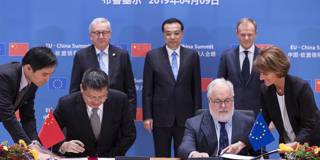In China’s view, the failure of existing international institutions to adjust to the growing clout of emerging and developing economies undermines the legitimacy of the entire multilateral system. But, far from trying to upend that system, China is working to strengthen it.
BEIJING – In recent years, China’s lead role in establishing new multilateral institutions – including the Shanghai Cooperation Organization, the Asian Infrastructure Investment Bank (AIIB), and the New Development Bank – has raised fears that the government aims to topple the existing world order. This interpretation misses a crucial point: China has benefited immensely from and continues to participate actively in – and even ardently defend – that very order.
China had no say in the formulation of today’s prevailing multilateral rules and structures, but it has generally adhered to them. To gain entry to the World Trade Organization in December 2001, for example, China acceded to a multitude of rules and eased or eliminated more than 7,000 tariffs, quotas, and other trade barriers.
The sacrifice was worth it. Membership in the WTO not only protected China’s interests in international trade relations; it also created commercial opportunities and new markets, and helped raise standards of living significantly for hundreds of millions of people. Without the rules-based global trade system, China would not have become the superpower it is today.

BEIJING – In recent years, China’s lead role in establishing new multilateral institutions – including the Shanghai Cooperation Organization, the Asian Infrastructure Investment Bank (AIIB), and the New Development Bank – has raised fears that the government aims to topple the existing world order. This interpretation misses a crucial point: China has benefited immensely from and continues to participate actively in – and even ardently defend – that very order.
China had no say in the formulation of today’s prevailing multilateral rules and structures, but it has generally adhered to them. To gain entry to the World Trade Organization in December 2001, for example, China acceded to a multitude of rules and eased or eliminated more than 7,000 tariffs, quotas, and other trade barriers.
The sacrifice was worth it. Membership in the WTO not only protected China’s interests in international trade relations; it also created commercial opportunities and new markets, and helped raise standards of living significantly for hundreds of millions of people. Without the rules-based global trade system, China would not have become the superpower it is today.